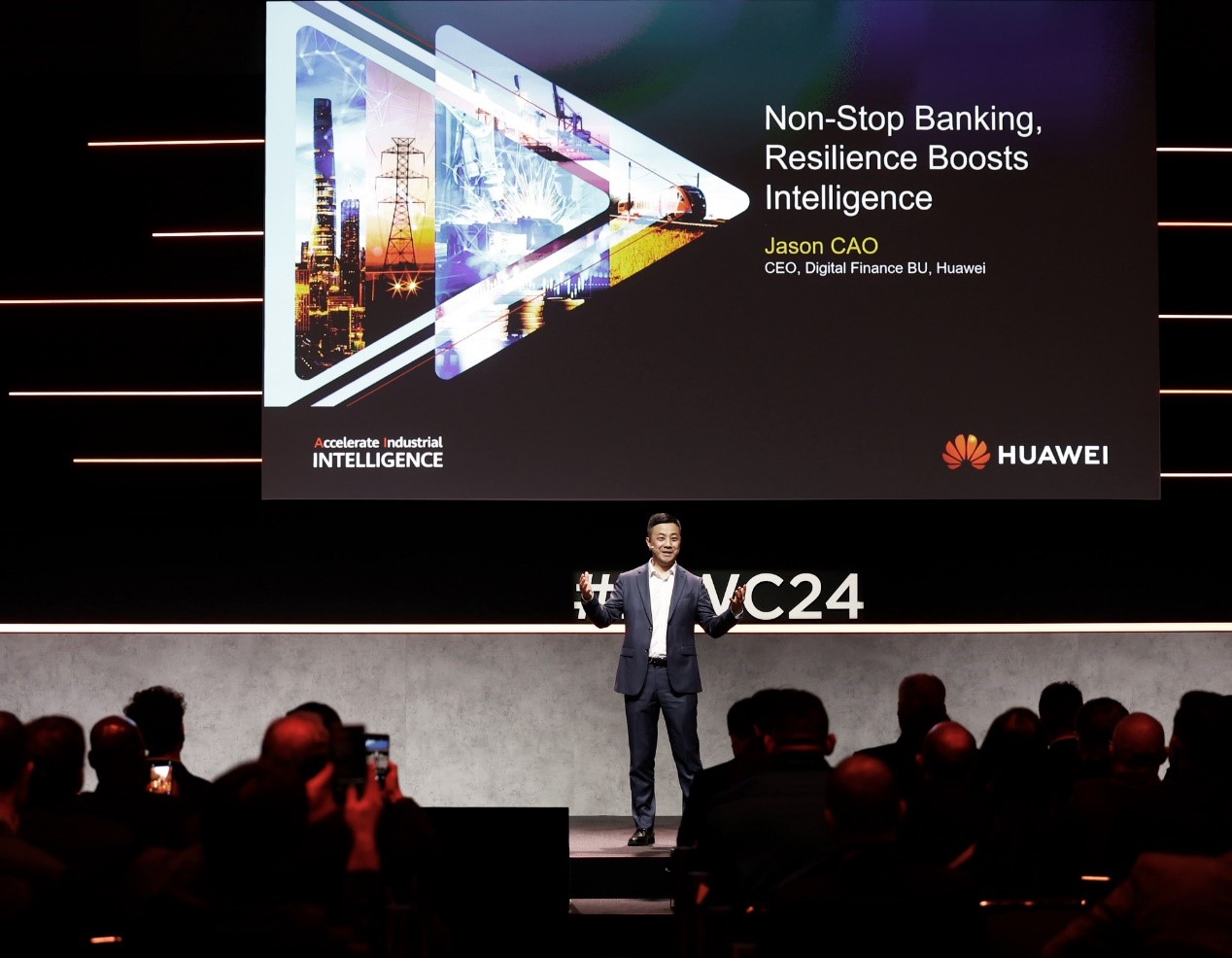Enterprise products, solutions & services
[Barcelona, Spain, February 26, 2024] At MWC Barcelona 2024,Huawei hosted a Digital Finance Session themed "Non-Stop Banking, Resilience Boosts Intelligence". At this session, Jason Cao, Huawei's CEO of Digital Finance BU emphasized that resilience is the foundation for everything, and elaborated how to build the infrastructure resilience in the intelligent era.

In the digital world, digital financial services represented by real-time payments are booming. Open Banking and scenario-based finance drive the transformation to open architectures. Generative AI is growing rapidly in key areas such as financial engagement and software development.
All of these changes pose new challenges to resilience. We must redefine and consolidate resilience to better accelerate the development of intelligence: ensure zero downtime and high availability of financial services, deliver a zero-wait user experience, and also achieve zero-touch operation while ensuring zero-trust service and data security.
As real-time payments increase the number of concurrent financial transactions from thousands to tens of thousands of TPS, the traditional architecture cannot support zero RPO. Therefore, Huawei has introduced a multi-active MAS architecture, which is essential for achieving the five nines (99.999) in SLAs.
The MAS architecture consists of three key capabilities: a cell-based application platform, a distributed database, and a highly available cloud-native infrastructure. Among them, distributed databases are the critical factor for SLAs.
To achieve Zero Downtime, Huawei has not only upgraded the MAS architecture, but also delivered successful practices in distributed databases. Moreover, Huawei has developed a next-generation distributed database called GaussDB, which was officially announced to global finance today at MWC2024. It boasts seven features including high availability, high security, high performance, high intelligence, high elasticity, easy deployment, and easy migration that make it an ideal choice for the financial industry to move towards zero downtime.
Storage is another core component for achieving high availability. Huawei storage has grown rapidly and has become the world's top 2 storage provider in 2023. Currently, Huawei's all-flash storage has supported more than 1000 PB data storage and enhanced zero downtime for global financial customers.
When moving towards large-scale distributed architectures, networks will be extremely complex. To ensure stable service running, autonomous networks will be more crucial than ever.
Huawei launched the Autonomous Driving Network 1.0 in 2021, which enables 1-minute fault detection, 3-minute fault locating, and 5-minute fault recovery. Now, the company has enhanced the solution from 1-3-5 to 0-1-3-5 ("0" means "0 Human Errors"), helping finance adopt Zero Touch operations.
Digital Map is the most important capability, which was upgraded based on Cloud-Map Algorithms and Digital Twins. It leverages large AI models to visualize the correlation and changes of networks, traffic, and applications in real time. The result is a network digital twin simulation, which ensures zero change errors.
As digitalization expands, so do the vulnerabilities of every data point and network connection. They face constant threats and attacks from various sources. In 2023, the number of cyber attacks on global banks increased by 520%, and the average service recovery time of financial institutions after ransomware attacks was 16.3 days.
In this context, attack and defense are in a race against time. The speed of data recovery is critical for business continuity and customer satisfaction. Huawei keeps improving product security to ensure fast attack detection, virus isolation, and data recovery, and has provided the industry's first multi-layer ransomware protection solution. This solution employs network firewalls to detect viruses and a storage air-gap to isolate them in seconds, thereby preventing intrusions promptly.
In addition, Huawei has upgraded the OceanProtect integrated backup solution. With the large-scale parallel algorithms, the data recovery speed can reach 172 TB/hour, five times higher than the industry average. This helps customers recover services immediately.
Huawei has provided data security solutions for more than 40 top banks worldwide in 2023, protecting more than 100 PB of core production data.
Zero wait is the ultimate customer experience for the financial industry in the digital era. To achieve this, real-time capabilities are critical.
However, traditional data architectures face many challenges in meeting this demand. Data is scattered across various systems, making it difficult to build real-time and accurate customer profiles.
To address these challenges, Huawei Data Intelligence Solution combines an all-serverless architecture with data lakehouse and data-AI convergence, which provides extremely strong real-time capability, especially for data warehouses.
This solution has served over 100 financial institutions worldwide. Two thirds of China's top 20 banks chose Huawei DWS to build leading data platforms. Thailand's top credit card issuer also chose Huawei DWS to build a unified data platform and speed up the transition from traditional marketing to real-time interactive marketing. This solution makes every engagement real-time. It is an ideal choice to build a zero-wait experience.
In the past year, Huawei's Global Finance Domain has made continuous progress. Huawei believes in building resilient infrastructure, accelerating application modernization, enhancing data-driven decisions, and enabling business scenario innovation and has worked closely with customers and partners to accelerate the digitalization and intelligence of finance.
Resilience boosts intelligence. In the digital world, all changes pose new challenges to resilience. We must redefine and consolidate resilience to better achieve non-stop banking: ensure zero downtime and high availability of financial services, deliver a zero-wait user experience, achieve zero-touch operation while ensuring zero-trust service and data security, and eventually accelerate the development of intelligence.